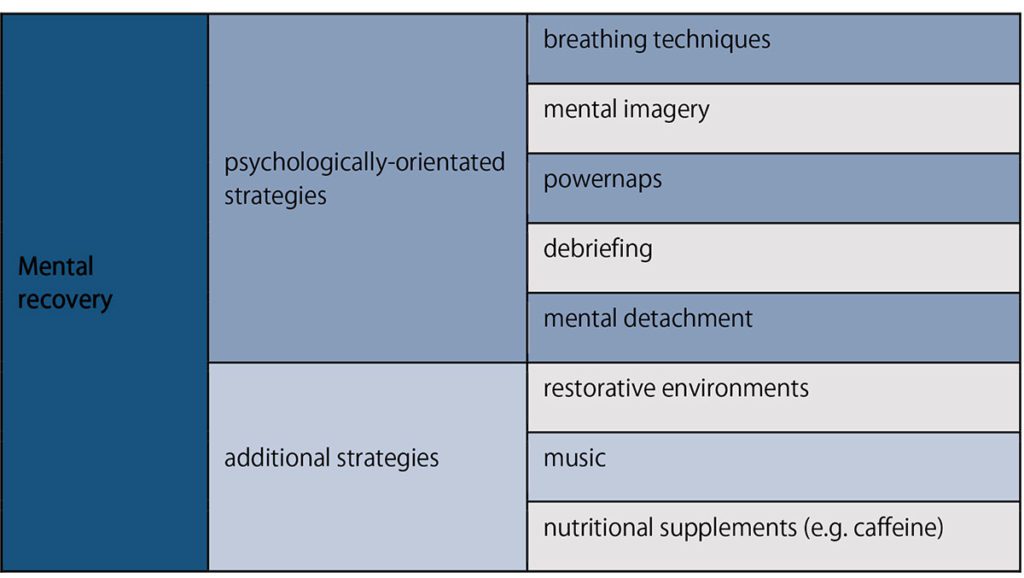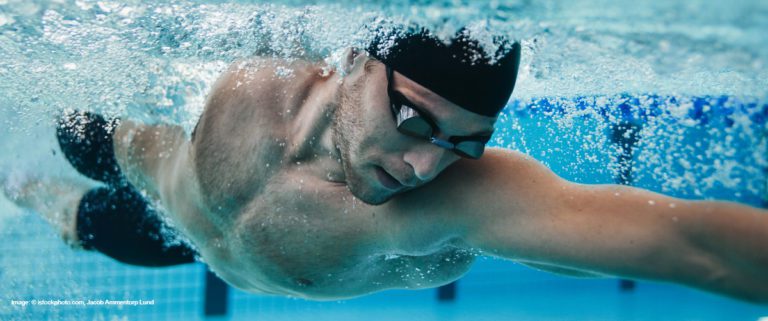When looking at the public sports coverage, there is a multitude of statements such as “We need a break, physically as well as mentally”. Moreover, the aspect of mental recovery comes up regularly in sport psychological consultancy and supervision. But which possibilities to mentally recover can athletes choose from?
The field of work psychology has already concluded that the relevance and impact of mental recovery breaks are a central issue and the benefits of such for the work context have been examined extensively [1]. In contrast, sports science has only started to pay attention to mental recovery and sports practice is increasingly giving more weight to the mental recovery aspect. The latest developments in high-performance sports underline that physical as well as mental demands have increased [2]. A holistic perspective emphasizes that athletes are exposed to multifactorial stress factors which are composed of global (e. g., sleep behaviour, insufficient recovery breaks, performance pressure), sport-specific (e. g., training and competition planning, competition travelling), and additional influencing factors (e. g., demands of sports and education). A sport-specific perspective additionally emphasizes that the stress pattern of sports like swimming, competitive shooting, or modern pentathlon which require the athlete to maintain a high cognitive as well as physical level over a prolonged time period (e.g., multiple competitions in one day) increases the risk of mental fatigue [3]. This clarifies that the individual resources for compensation of sport-specific and external training and competition load will not be sufficient in case the individual capacity of coping with such is exceeded. The result could be a state of mental fatigue. The sport-practical necessity of focusing on mental recovery measures can be derived from this, as this can counteract an acute mental fatigue state.
Mental fatigue and mental recovery as central terms
Essentially, mental fatigue is understood as a biopsychological state which develops due to prolonged cognitive and mental demands and can have a negative effect on athletic performance [4]. The effects of a mental fatigue state can be visible on three different levels, the psychological-subjective level, the behavioural level, and the physiological level [5]. Current research shows that mental fatigue is mainly perceived as an emotionally subjective state and effects are visible on the first two areas.
Indicators for the first level comprise an increased feeling of fatigue, lack of activation, and decreased motivation and attention [5]. Central indicator is the increased perception of exertion which negatively affects the sport-specific performance. Key aspect on the behavioural level is the decrease of cognitive performance, which is shown in limited ability to concentrate, a plummeting accuracy of execution and a delay of reaction. A survey study with the aim to understand mental fatigue adds to these findings, as aspects like mental disengagement, limited guidance of attention, and lower discipline and enthusiasm are described as typical [6,3].
“For me personally, mental fatigue is a lack of ability to concentrate, lack of motivation or personal drive to train or take part in a competition. I was having a hard time focusing on technical elements and the actual competition when I was mentally tired.”
(former high-performance swimmer and two-time Olympian)
The concept of mental recovery comprises the recovery process of cognitive abilities (e. g., the ability to concentrate) and the restoration of mental resources by reducing mental demands during a sufficient recovery break [7]. According to this, mental recovery includes cognitive as well as emotional processes. The aim of a short-range mental recovery is securing the willingness to perform in the following stress phases as well as the restoration of the needed resources by means of suitable recovery measures. With regard to this, the recovery break plays a crucial role in enabling the athlete to recover mentally [8]. Moreover, mental detachment seems to be especially relevant for regaining a mental balance by alternating between stress and recovery.
Mental recovery strategies in sports
It can be assumed that the different levels are mutually dependent. However, it seems sensible to apply mental recovery strategies on the subjective-psychological as well as behavioural level. Typical strategies to react to mental and physical outcomes would be psychological recovery strategies such as self-regulation techniques, resource activation strategies, and relaxation measures [9]. Loch et al. have summarized the current scientific knowledge to gain more precise insights into mental recovery in high-performance sports. Their focus hereby is on mental recovery strategies for competition breaks* [10]. Based on this, one can differentiate between psychologically oriented strategies (e. g., breathing regulation techniques, training of mental imagery, power nap measures, mental detachment) and complementary psychological measures (e. g., music; see Tab.1). These strategies can support reducing a stress reaction, regulating the arousal level, increasing the mental well-being, and promoting concentration, motivation, and alertness of athletes during their break to subsequently reach the individual performance optimum [3].

Recommendations for sports practice
So far, recovery measures have been separated from a physical and comprehensive-psychological consideration. Prospectively, there should be a focus on mental recovery as a distinct work field. The mediation and learning of self-regulation skills – consisting of self-awareness, self-regulation, and self-control – seem to be beneficial for the mental recovery process [11]. Especially in the light of athletes being able to realize how to prepare mentally for a stress phase (“switch on”), but at the same time not being able to use an effective mental recovery measure during their break (“switch off”) it appears necessary to summarize a first guidance for the concept of mental recovery in sports [3].
- Mental recovery is a highly individual process. Therefore, mental recovery strategies should be applied according to the individual needs.
- Athletes should learn to assess their own mental state to recognize an acute imbalance of recovery and stress.
- A regular monitoring (e. g., with psychometric instruments) of mental fatigue and recovery enables the planning and implementation of deliberate mental recovery phases.
- Chosen and pro-actively used recovery measures can enable the athlete to react in the best possible way to acute mental fatigue states and increase the recovery gain.
- The development of a specific recovery routine (e.g., combination of physical and mental recovery strategies) for recovery breaks is helpful for optimizing the
recovery state.
Literature
[1] Sonnentag, S., & Fritz, C. (2015). Recovery from job stress: The stressor-detachment model as an integrative framework. Journal of Organizational Behavior, 36(S1), 72-103. doi:10.1002/job.1924
[2] Loch, F., Hof zum Berge, A., Kölling, S., & Kellmann, M. (2020). Stress states, mental fatigue and the concept of mental recovery. In M. C. Ruiz & C. Robazza (Eds.), Feelings in Sport. Theorie, research, and practical implications for the performance and well-being. Abingdon: Routledge.
[3] Loch, F. & Kellmann, M. (2020). Mentale Ermüdung und Erholung. In T. Meyer, A. Ferrauti, M. Kellmann & M. Pfeifer (Hrsg.), Regenerationsmanagement im Spitzensport (Teil 2). Bonn: Bundeinstitut für Sportwissenschaft (BISp).
[4] Boksem, M. A. S., Meijman, T. F., & Lorist, M. M. (2005). Effects of mental fatigue on attention: An ERP study. Cognitive Brain Research, 25(1), 107 – 116. doi:10.1016/j.cogbrainres.2005.04.011
[5] Van Cutsem, J., Marcora, S. M., De Pauw, K., Bailey, S., Meeusen, R., & Roelands, B. (2017). The effects of mental fatigue on physical performance: A systematic review. Sports Medicine, 47(8), 1569–1588. doi:10.1007/s40279-016-0672-0.
[6] Russell, S., Jenkins, D., Rynne, S., Halson, S. L., & Kelly, V. (2019). What is mental fatigue in elite sport? Perceptions from athletes and staff. European Journal of Sport Science, 19, 1367–1376. doi:10.1080/17461391.2019.1618397.
[7] Balk, Y. A., de Jonge, J., Oerlemans, W. G. M., & Geurts, S. A. E. (2019). Physical recovery, mental detachment and sleep as predictors of injury and mental energy. Journal of Health Psychology, 24(13), 1828 – 1838.doi:10.1177/1359105317705980.
[8] Eccles, D. W., & Kazmier, A. W. (2019). The psychology of rest in athletes: An empirical study and initial model. Psychology of Sport and Exercise, 44, 90–98. doi:10.1016/j.psychsport.2019.05.007.
[9] Kellmann, M., Bertollo, M., Bosquet, L., Brink, M., Coutts, A. J., Duffield, R., … Beckmann, J. (2018). Recovery and performance in sport: Consensus statement. International Journal of Sports Physiology and Performance, 13(2), 240–245. doi: 10.1123/ijspp.2017-0759.
*[10] Loch, F., Ferrauti, A., Meyer, T., Pfeiffer, M., & Kellmann, M. (2019). Resting the mind – A novel topic with scarce insights. Considering potential mental recovery strategies for short rest periods in sports. Performance Enhancement & Health, 6, 148–155. doi:10.1016/j.peh.2019.04.002.
[11] Balk, Y. A., & Englert, C. (2020). Recovery self-regulation in sport: Theory, research, and practice. International Journal of Sports Science & Coaching, 15(2), 273-281. doi:10.1177/1747954119897528.
Autoren
hat Sportwissenschaft (M.Sc.) an der Ruhr-Universität Bochum studiert und ist aktuell wiss. Mitarbeiter (u.a. in dem Projekt "Regenerationsmanagement im Spitzensport [REGman])" sowie Doktorand (Forschungsschwerpunkt mentale Ermüdung & mentale Erholung im Sport) am Lehr- und Forschungsbereich Sportpsychologie der Ruhr-Universität Bochum. Zudem ist er als sportpsychologischer Experte (asp) im Nachwuchs- und Leistungssport tätig.



